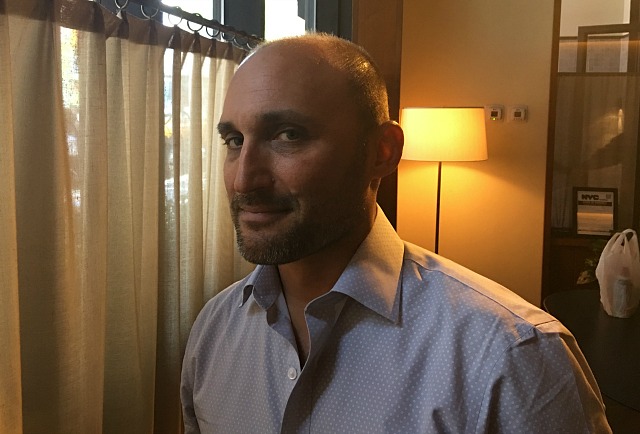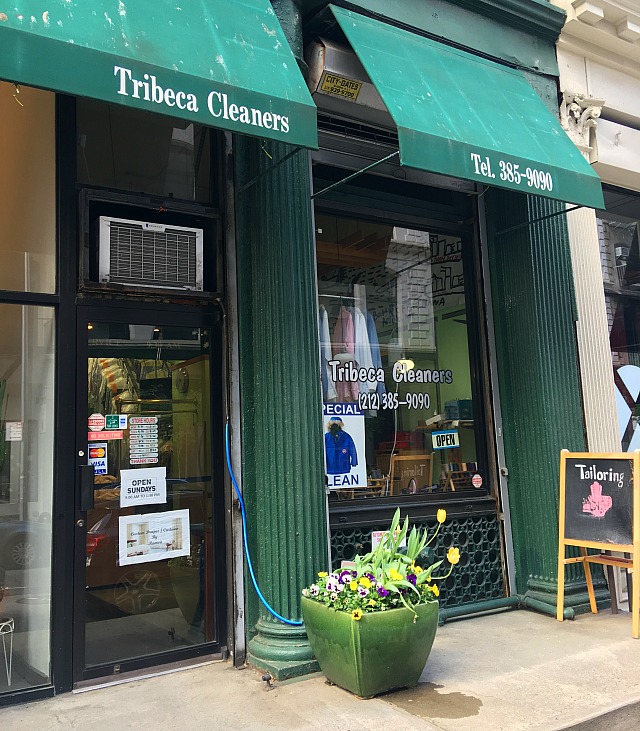It would be quite a thing if Dwayne Johnson was to somehow land the Republican Presidential nomination in 2024, and find himself running against Democratic Presidential candidate Cory Booker. It would be the first time in U.S. history that opposing Presidential candidates would so closely resemble each other. Who would be more likely to win? It pains me to admit that Johnson would probably do better with low-information types. I’m thinking about Booker because the other day a friend mentioned that he’s probably the hottest contender right now for the 2020 Democratic nomination. He also mentioned that he’s mostly persuaded, based on what he’s heard, that the rumors are true. I hate admitting this also as I couldn’t be less interested in such matters, but the Democratic powers-that-be are probably concerned along these lines.
Day: May 10, 2017
Richly Rewarding “Trip” Is “Not For Dead Fans”
Yesterday I had a brief chat with Amir Bar-Lev, the highly respected director of My Kid Could Paint That, Trouble the Water, The Tillman Story, Happy Valley and, most triumphantly, Long Strange Trip (Amazon, 5.25). I’m a huge fan of this 241-minute doc, which more than justifies its length and winds up really bringing it during the second half. I went in as a marginal Grateful Dead fan and came out the other end as something of a devotee.
I’m sorry I won’t be in the States when Long Strange Trip has a one-night-only nationwide premiere on 5.25, but I’ll definitely be snagging the three-disc soundtrack CD. Amazon wil begin streaming the doc in 220 countries beginning on 6.2. Here, again, is the mp3. Here are some ABR excerpts from our discussion:

Long Strange Trip director Amir Bar-lev — Tuesday, 5.9, 12:35 pm.
Excerpt #1: “The film is not for fans…it’s for people who are not Dead fans. It’s meant to serve as a kind of marriage counselor between people who loved the band and people who never got them. Very few people are indifferent…this film is meant for people who never really understood the whole thing.”
Excerpt #2: “I’m not ready to start another film now. I’m tired. This one took a lot out of me. I remember being asked ‘if you could make any film, what would it be?’ And I said ‘I’ve just made it. This is the film I’m really the most proud of.'”
Excerpt #3: “The original idea was to make a 90-minute doc that would come out on the 50th anniversary of the start of the Grateful Dead‘s beginning, or two years ago. Everything doubled…the length, the budget, everything. It was meant to be a theatrical film, and then I couldn’t cut it down. I couldn’t cut it down. We fine-cut out way through it from the beginning, and [then] we had a working cut that was two hours long, which took the story up to 1974.”
HE review excerpt: “This is a first-rate chronicle of a great, historic American band. Don’t let the four-hour running time stop you because this time the length fits the scale of the tale. It’s one sprawling, Olympian, deeply-dug-into achievement, largely because it focuses on the story instead of the historical bullet points, and because it takes the time to explain the appeal of Grateful Dead music and the whole Deadhead ’80s culture thing, which I paid no attention to when it was happening.
“The first half is a good, comprehensive mid-to-late-’60s history lesson — efficient, amusing, well-honed and sometimes great. But Act Two (or the last two hours) really brings it home. This is where the heart is, what turned the light on — the thing that told me what Amir Bar-Lev is really up to.”
Return of Leon Vitali
Longtime HE readers will recall the Barry Lyndon aspect-ratio contretemps that happened six years ago. Lyndon costar and longtime Stanley Kubrick assistant Leon Vitali, retained by Warner Home Video as a technical consultant on a spate of Kubrick Blurays, has insisted that the Lyndon Bluray be issued at 1.77:1 rather than 1.66:1, an a.r. previously adopted when WHV released the 1975 classic on laser disc. I hit the roof when I read about this. I argued, howled, seethed.
Then Glenn Kenny posted a 12.8.75 “smoking gun” letter written by Kubrick and sent to U.S. exhibitors. It stated that Barry Lyndon had been shot in 1.66 and should ideally be projected this way.

Now there’s a documentary about Vitali, Filmworker, that will show in a few days time at the 2017 Cannes Film Festival, under the Cannes Classics subsection. The director is Tony Zierra.
Synopsis: “It’s a rare person who would give up fame and fortune to toil in obscurity for someone else’s creative vision. But that’s exactly what Leon Vitali did after his acclaimed performance as ‘Lord Bullingdon” in Stanley Kubrick’s Barry Lyndon. The young actor surrendered his thriving career to become Kubrick’s loyal right-hand man. For more than two decades, Leon played a crucial role behind-the-scenes helping Kubrick make and maintain his legendary body of work.
No Reviews Until 5.22
Without saying anything about War Machine one way or the other, I can at least mention that a pop-through supporting performance is given by Keith Stanfield. I’ve been paying attention to this 25 year-old actor for three years — Jimmie Lee Jackson in Selma, “Bug” in Dope, Snoop Dog in Straight Outta Compton and especially that creeped-ut guy passing along those weird vibes to Daniel Kaluuya during that backyard party scene in Get Out. Stanfield plays another haunted type in War Machine, an Army Corporal serving in Afghanistan who’s having trouble understanding Brad Pitt‘s convoluted strategy, and who also carries a climactic battle moment in Act Three. I’m just saying that Stanfield is the guy you’re talking about when it’s over. His character brings a couple of reality-check moments that stick.
Tap On The Shoulder
A writer never plans or knows anything in advance. He/she just lives, roams around, listens, watches. And then suddenly you’re “called.” You hear that whisper or feel a little tap on the shoulder, and either you decide that you’ve just heard something worth exploring or you don’t. The thing about good ideas (i.e., inspiration) is that they never shake you by the lapels or announce themselves like Roman trumpets. They’re like those tonal sounds that elevators make when they arrive on a certain floor….poon. Like the vibration of a phone that’s had the sound turned off. Whether or not you answer and listen is up to you.
“There’s No Crying In Baseball!”
I had a Tom Hanks-style exasperation moment inside Tribeca Cleaners this morning. I gave the guy some items (jeans, light green chinos, 2 T-shirts, pair of socks), adding that I need them by 5 or 6 pm tomorrow. He held up the socks and asked if I wanted them dry-cleaned.
Me: “Socks? No, I don’t want them dry-cleaned. In fact, I don’t want anything dry-cleaned. Don’t you guys offer laundry service?” Guy: “Yes, but most people want dry cleaning.” Me: “These are washables. Who wants jeans and T-shirts dry-cleaned?” Guy: “Most people. They want their jeans smooth.” Me: “Why? They’re just jeans.” Guy: “They don’t want any wrinkles.” Me: “Jeans don’t wrinkle. You wash them and you put them on. That’s what jeans are about…you know, the rugged authenticity thing.”
This tells you what kind of people are living in Tribeca these days. Phonies. Pod people. 21st Century Marie Antoinettes. People who would’ve run screaming from Tribeca if they’d come down here in the ’70s or ’80s.

Cannes Shitcans Netflix Fare
It’s been announced that as of next year, Netflix releases will not be screened in competition at the Cannes Film Festival. Unless, that is, the straight-to-streaming service changes its attitude about theatrical playdates. Amazon, Netflix’s biggest online competitor, has declared an intention to open films theatrically before going to streaming; Netflix has been fairly adamant about not doing that. French exhibitors have recently been venting much anger about this.
Official Cannes statement, released this morning: “A rumor has recently spread about a possible exclusion of the Official Selection of Noah Baumbach‘s The Meyerowitz Stories and Bong Joon Ho‘s Okja, which have been largely financed by Netflix. The Festival de Cannes does reiterate that, as announced on April 13th, these two films will be presented in Official Selection and in Competition.
“The Festival de Cannes is aware of the anxiety aroused by the absence of the release in theaters of those films in France. The Festival de Cannes asked Netflix in vain to accept that these two films could reach the audience of French movie theaters and not only its subscribers. Hence the Festival regrets that no agreement has been reached.
“The Festival is pleased to welcome a new operator which has decided to invest in cinema but wants to reiterate its support to the traditional mode of exhibition of cinema in France and in the world. Consequently, and after consulting its Members of the Board, the Festival de Cannes has decided to adapt its rules to this unseen situation until now: any film that wishes to compete in Competition at Cannes will have to commit itself to being distributed in French movie theaters. This new measure will apply from the 2018 edition of the Festival International du Film de Cannes onwards.”

